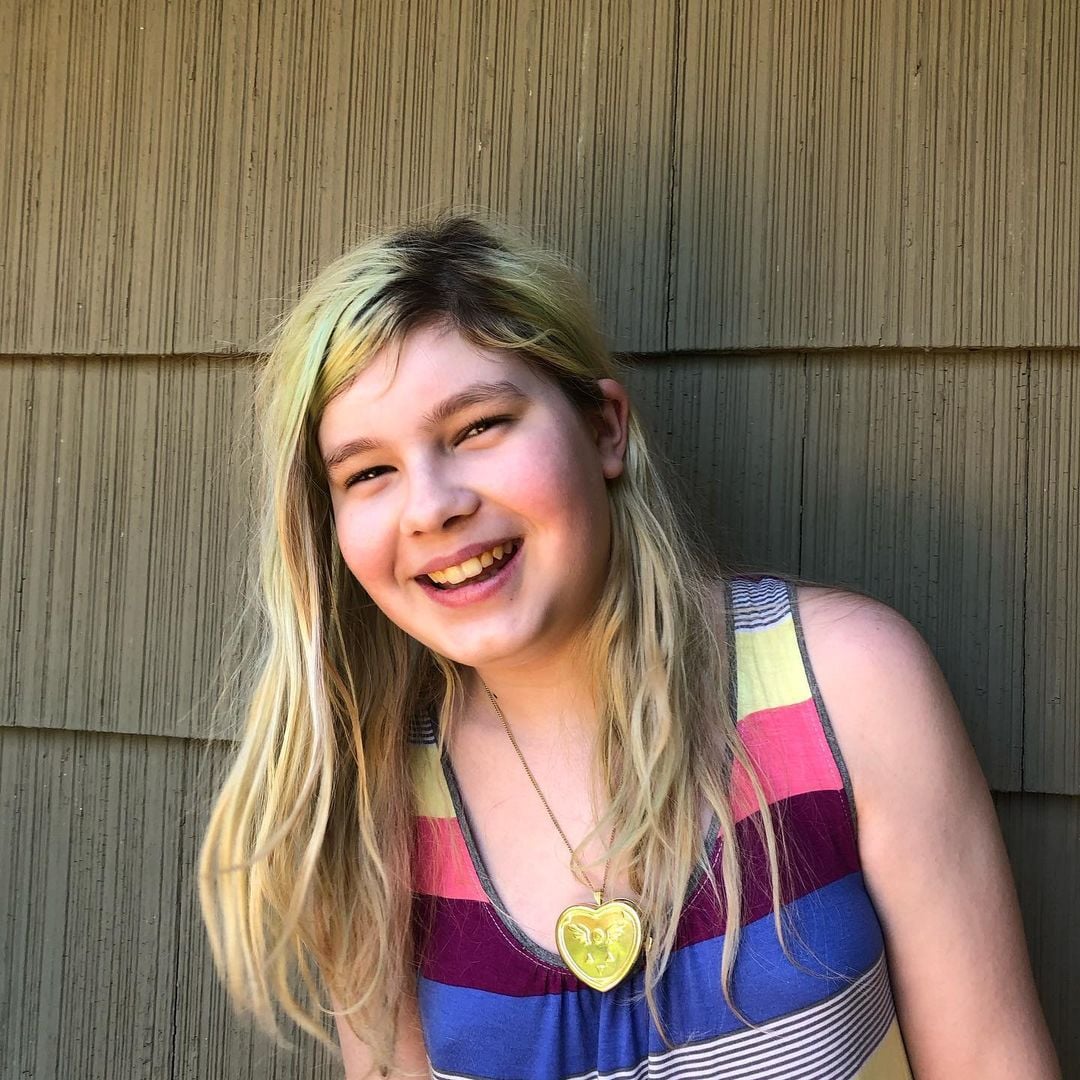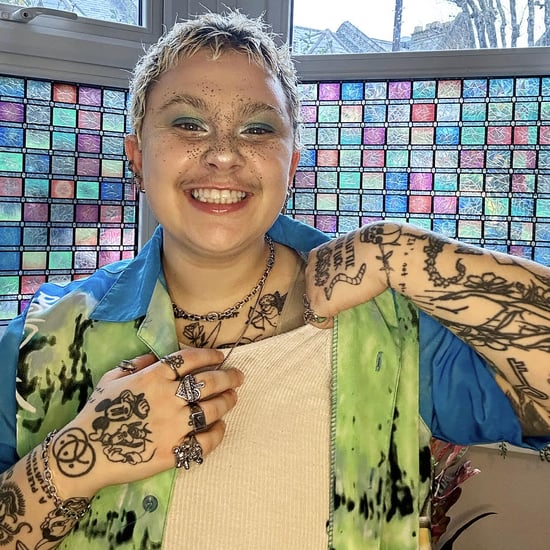A Mom on Her Daughter be a Trans Activist on Her Own Terms
Why This Mom Supports Her Trans Teen Advocating For Her Community on Her Own Terms

Avery Jackson, a 13-year-old trans activist whom you may recognise from the HBO Max documentary Transhood, has grown a lot over the five-year filming period. Now that she's officially a teenager, Avery and her mother, Debi, have been incredibly open about their family's journey and their roles as advocates for the transgender community. To raise awareness about the work that still needs to be done in terms of LGBTQ+ rights and the TRANSlation Summit video series — which families can watch on HBO Max's Youtube — we spoke with Debi to learn what life has been like since the cameras stopped rolling in 2019.
"Hindsight is 2020, and for years we've talked about how, at 4, she was able to tell us that she's a girl, but when you go back through pictures and videos, and holiday memories and things, we realised that she was 3 when she started showing gender non-conforming behaviour," Debi told POPSUGAR. "We just figured this was a stage that kids go through developmentally, and not a big deal. It was definitely more extreme than our older son had experienced, but he's done a little bit of it, too."
Eventually, Debi noticed a startling change in her daughter, who was then enrolled in preschool. "Avery stopped being the happy-go-lucky kid, and became very depressed and sullen," explained Debi. "She started acting out at preschool. She didn't want to go anymore. Again, looking back, we figure out that's about the time she had asked me to paint her fingernails one day while I was doing my toes. She went into preschool and the teacher was horrified that this little boy had nail polish on, so she never asked for that again."
"She was connecting with girls. She was trying to find ways to act like the other girls in her class, but she was getting messages from other people that wasn't OK," Debi continued, noting that her daughter was just trying to be her authentic self. "That's where the depression and anger, and anxiety were coming from. Just before Christmas, she was picking out toys in a catalogue and circled all the ones that were for girls, and then said, 'You can't tell Santa, he'll think that I'm a bad kid, and then he'll skip our house, and my brother won't get anything.'"
Around this time, Avery began talking about the concept of death more, which was incredibly concerning to Debi. "She had been depressed and anxious and acting out, but she also started talking excessively about death," she said. "She would ask me, 'Could I die if I fell off the roof of our house or does the building have to be taller?' What four year old does that?"
"Avery was transitioning before we even knew, she was pushing it and trying to transition herself, without it being officially called that."
Despite pushback from Avery's teachers and some of the Jackson's friends and family, Debi and her husband set Avery up with a therapist who specialised in gender. After a few months of appointments, Avery's therapist pulled Debi and her husband aside to tell them that she's never seen a child this age transition, but many of her adult clients knew that they were transgender around the age of 4 or 5 years old. At this point, Debi decided to let Avery take the lead. While they weren't going to push their child to change their pronouns or name, they agreed to wait and see what happens.
"We shifted into an affirmative model of care, where you affirm them, 'Yes, okay we listen to you,'" said Debi. "You let them lead. Avery was transitioning before we even knew, she was pushing it and trying to transition herself, without it officially being called that, without us really recognising what was happening."
As soon as Avery began to embrace her true identity, the frightening discussions about death promptly ceased. "Once we switched pronouns, and said, 'You're a girl and our daughter,' everything changed," said Debi. "It all went away. She was happy. She wanted to go to school. She wanted to be out, playing again. That was what told us that we had made the right decision."

Despite growing up as a conservative Southern Baptist in Alabama, Debi quickly threw herself into trans advocacy, losing friends and family along the way. Regardless, Debi has worked to do everything she can to support her daughter. Most notably, Avery was on the cover of National Geographic's January 2017 issue, which centreed on gender. The poster child for trans rights, Avery spent years in the spotlight between her inclusion in the HBO documentary, Transhood, and other projects and interviews. Now, at age 13, Avery has decided to take a break from advocacy to focus on the other facets of her identity.
"She eventually got a bigger platform," said Debi. "She would say, 'I'm helping others, and I want to change the world, so other kids can be just as happy as I am.' As she got older, there was that shift. Of course, I think it was really the negativity of the current [political] administration. They have been actively pulling back protections. We tried to shield her from it, but LGBTQ+ advocacy is my work now."
Debi continued, sharing how Avery became concerned with how open her family was at times. "She would hear me talking to my husband, and ask, 'Why are you having to go and tell so many people about trans kids, Mom?' I responded, 'Well, because I'm working with another school because that school isn't supporting a student, and I want that kid to have a chance,'" explained Debi. "I think a lot of that is what made her decide that she didn't want to be so public at the time. She just wanted a chance to be a kid, so that was another part of the evolution that I appreciate."
"She just wanted a chance to be a kid, so that was another part of the evolution that I appreciate."
After opting to take a step back from the spotlight, Avery has been questioning her next steps now that she's a teenager. "Even now, I ask her, 'Do you ever think you'll be public again?' and she said, 'I don't know, but if I do, I want [my advocacy work] to be on my terms, and I don't necessarily want it to be about trans people. There are other people hurting. My friends who have a white mom and a Black dad are being discriminated against. There are kids in cages at the border. Why aren't we talking about that anymore? Why is that suddenly not on the news, Mom? I know it's still happening.'"
Of course, Debi and her husband are fully supportive of whatever path Avery wants to take in terms of advocacy. After all, the teenage years are when a person is supposed to make new friendships and figure out what they're truly passionate about in life.
Dr. Scott Leibowitz, a pediatric psychiatrist and the medical director of behavioural health for the THRIVE program at Nationwide Children's Hospital, has advice for parents of transgender kids who are trying to strike the balance between advocating for their rights and letting them suss out their own path.
"It's a hard question because there's no one way for a person to be transgender, and there's also no one way that gender plays into a person's entire identity," Leibowitz explained. "When a young person is experiencing the challenges that are directly the result of being transgender, it's very easy for families to need to advocate on that basis alone because of how far behind society is when it comes to helping support these people who are truly among the most marginalized out there. That leads people to make the issue about their transness."
"Parenting all comes down to knowing when to fight, but also knowing when to take a step back."
Leibowitz noted that trans kids' needs may shift over time, and that's OK. "Young people may start to feel more supported, and start to feel more comfortable with who they are, and start to feel affirmed by others, they are able to integrate their transness into their wholeness," he said.
His advice? Don't forget to give adolescents space when they need it. "At times, gender might very much be their biggest priority," he said. "Whereas in other situations, young people may feel like they're being affirmed, and in those situations being trans is just only one very small part of who they are, and really it comes down to how much can society move past transgender [issues] being such a challenging thing to deal with."
Additionally, Dr. Leibowitz can't emphasise enough how important listening to your kids' needs is. "Being a good parent means being in tune with what your child or a teenager is going through, and creating a space for them that allows that young person to truly say what is the source of whatever challenge they're going through at that moment in time," he explained. "It's also important to create a space for that young person to maybe say, 'Listen, I don't need your help with this right now either.' Parenting all comes down to knowing when to fight, but also knowing when to take a step back."
Now, Debi is simply focusing on letting Avery come into her own as a teen. "Being 13 is hard for anyone," she shared. "All of her friends, who are mixed gender, are struggling right now. You're trying to be more independent. You're trying to figure out yourself. You're developing more friendships, and expanding your social world, and you're thinking in terms of your education, what do you want to do with your life."







